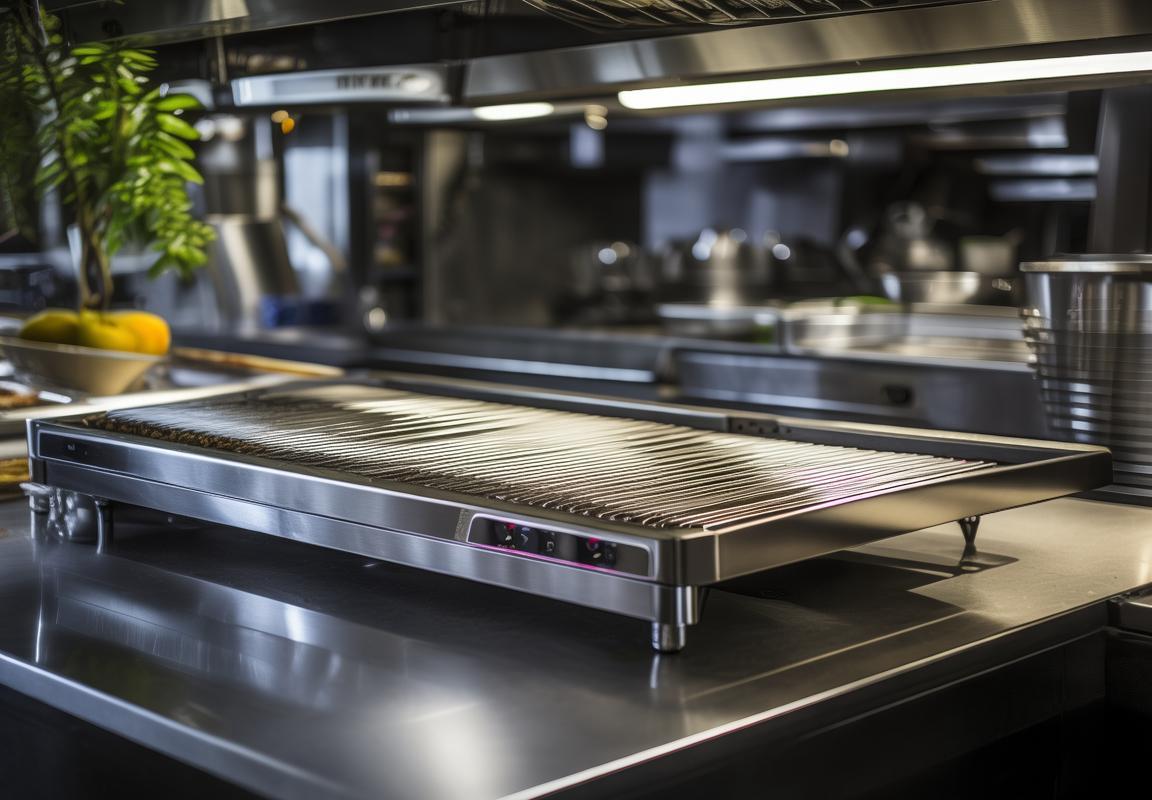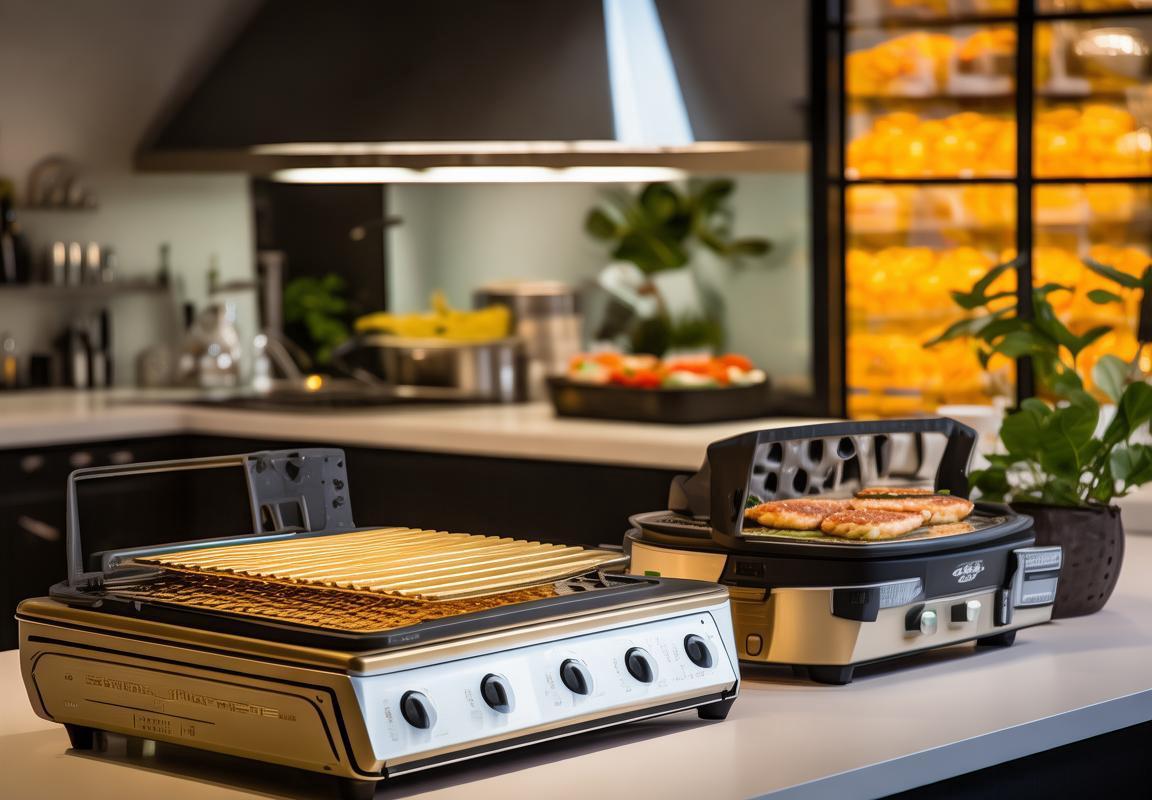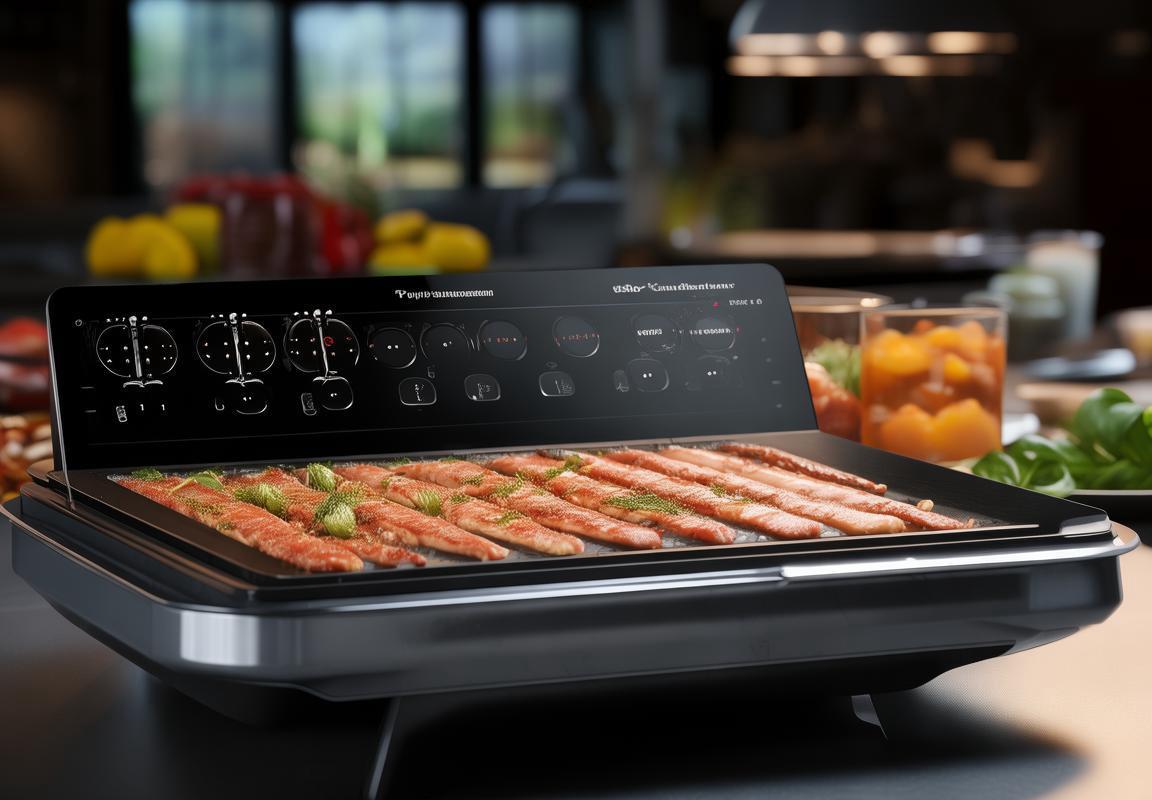In the competitive world of culinary appliances, private label contact grills have emerged as a strategic choice for businesses looking to carve out a niche in the market. These customized grills offer a blend of brand identity and quality, making them an attractive option for entrepreneurs and established companies alike. As the demand for unique and high-quality kitchen gadgets grows, understanding the ins and outs of partnering with a contact grill supplier is crucial. This article delves into the intricacies of this partnership, highlighting key considerations and insights for a successful private label venture.
Discover the Benefits of Using a Contact Grill Supplier for Your Private Label Needs
When you’re looking to establish your brand in the culinary equipment market, partnering with a contact grill supplier for private label needs can be a game-changer. These specialized suppliers offer a range of benefits that can significantly enhance your product offerings and business strategies.
Firstly, a contact grill supplier provides access to top-quality equipment. These suppliers often work directly with manufacturers, ensuring that the grills they offer are of the highest standard. This means your customers can expect consistent performance and durability, which is crucial for building trust in your brand.
Secondly, using a contact grill supplier for private labeling allows for a streamlined production process. These suppliers have the infrastructure and expertise to handle large orders efficiently. This efficiency translates to shorter lead times and more timely product delivery, which can be a major advantage in the competitive foodservice industry.
Moreover, a contact grill supplier can offer a variety of grill designs and configurations. This flexibility is key to meeting different market demands and consumer preferences. Whether your target audience is interested in sleek, commercial-grade models or compact, home-use appliances, a reputable supplier can tailor the product to your brand’s image and customer needs.
One of the standout benefits of private labeling is the ability to customize the product with your brand’s logo and specifications. This not only differentiates your product on the shelf but also enhances brand recognition. A contact grill supplier that specializes in private labeling will work closely with you to ensure every detail aligns with your brand identity, from the design to the packaging.
Quality control is another critical aspect that a contact grill supplier excels in. These suppliers typically have rigorous quality assurance protocols in place to ensure that every grill meets the highest standards. This peace of mind can be passed on to your customers, who can rely on your private label product for its reliability and performance.
Cost-effectiveness is often a primary concern for businesses. Working with a contact grill supplier for private label products can lead to significant cost savings. Bulk purchasing and efficient manufacturing processes can lower your per-unit costs, allowing you to offer competitive pricing without compromising on quality.
Furthermore, a contact grill supplier can offer a wealth of knowledge about market trends and consumer preferences. This insight can be invaluable when it comes to developing new products or enhancing existing ones. By staying ahead of the curve, you can ensure that your private label contact grills remain relevant and appealing to your target market.
Another benefit is the supplier’s ability to manage inventory. They can store your products in bulk, ship them in the quantities you need, and even offer just-in-time delivery options. This can help you maintain optimal stock levels, reducing the risk of overstocking or stockouts.
Additionally, a contact grill supplier may offer value-added services such as after-sales support. This can include customer service hotlines, warranty management, and technical assistance. By providing comprehensive support, you can improve customer satisfaction and loyalty.
In terms of market access, a contact grill supplier can help you expand into new markets. They may have existing relationships with distributors and retailers, making it easier for you to reach a wider audience without the need to build those networks from scratch.
Lastly, partnering with a contact grill supplier for private label needs can provide you with the scalability you need to grow your business. Whether you’re just starting out or looking to expand your product line, these suppliers can adapt to your changing requirements and help you scale up production as your business grows.
In summary, using a contact grill supplier for your private label needs offers numerous benefits, from quality and customization to cost savings and market access. By leveraging these advantages, you can strengthen your brand’s position in the market and provide your customers with products that meet their expectations and exceed their needs.

Why Private Label Contact Grills Are a Smart Choice for Businesses
Private label contact grills have emerged as a smart and strategic choice for businesses looking to carve out a niche in the competitive market. Here are several compelling reasons why opting for private label contact grills can be a game-changer for your business:
-
Unique Brand Identity: When you choose private label contact grills, you’re not just purchasing a product; you’re investing in a brand identity. This allows you to create a unique selling proposition (USP) that sets your products apart from the competition. With custom branding, you can build a loyal customer base that recognizes and trusts your brand.
-
Cost-Effective Production: Private label manufacturing often offers cost advantages over buying branded products. By purchasing in bulk, you can negotiate better prices with suppliers, which can significantly reduce your per-unit costs. This cost savings can be passed on to your customers, making your products more competitive in the market.
-
Customization to Suit Your Market: The ability to customize contact grills to meet specific market demands is a key benefit of private labeling. Whether it’s adjusting the size, design, or features to cater to a particular demographic or market trend, private label allows you to tailor your products to the preferences of your target audience.
-
Faster Time to Market: Developing a private label product can be much quicker than creating a new, proprietary product from scratch. Since the design and manufacturing processes are already established by the supplier, you can bring your product to market faster, capitalizing on emerging trends and filling gaps in the market.
-
Enhanced Product Quality: Private label suppliers often have stringent quality control measures in place. By working with a reputable supplier, you can ensure that your contact grills meet high standards of quality and reliability. This can help build trust with your customers and reduce returns and customer complaints.
-
Marketing Flexibility: With private label contact grills, you have the flexibility to create your own marketing campaigns and promotional materials. This allows you to highlight the unique aspects of your brand and products, which can be more effective in attracting customers than generic marketing efforts.
-
Scalability: Private label manufacturing is highly scalable. As your business grows, you can increase your order quantities without the need to invest in new equipment or manufacturing capabilities. This scalability ensures that you can meet rising demand without disrupting your operations.
-
Access to Exclusive Products: By working with a private label supplier, you gain access to exclusive products that may not be available through traditional channels. This exclusivity can be a significant draw for consumers looking for something different and innovative.
-
Brand Loyalty: Private label products can foster brand loyalty. When customers associate your brand with a particular product or quality, they are more likely to return for repeat purchases. This loyalty can lead to higher customer lifetime value and a more stable revenue stream.
-
Competitive Edge: In a market saturated with generic products, private label contact grills can give you a competitive edge. By offering a unique product that meets the specific needs of your customers, you can differentiate your business and attract a loyal customer base.
-
Supply Chain Stability: Private label suppliers typically offer a stable supply chain, ensuring that you receive your products on time and in the quantities you need. This reliability is crucial for maintaining inventory levels and meeting customer demand.
-
Future Product Development: Partnering with a private label supplier can also open doors for future product development. As you grow and learn more about your customers’ preferences, you can work with your supplier to create new and improved products that continue to meet market demands.
In summary, private label contact grills offer numerous advantages for businesses seeking to establish a strong market presence. From cost savings and customization to quality assurance and marketing flexibility, the benefits are clear. By choosing private label, businesses can create a unique product that resonates with their target audience, builds a strong brand, and ultimately drives success in the marketplace.

How to Choose the Right Contact Grill Supplier
When it comes to selecting the right contact grill supplier for your private label needs, the process can seem daunting. However, by focusing on a few key factors, you can make an informed decision that will benefit your business in the long run. Here are some essential considerations to guide you in choosing the perfect contact grill supplier:
-
Reputation and ExperienceLook for a supplier with a solid reputation in the industry. Experience counts, as a supplier with years of operation under their belt is likely to have a better understanding of market trends and customer preferences. Check online reviews, testimonials, and ask for references to gauge their standing within the market.
-
Product QualityThe quality of the contact grills is paramount. Ensure that the supplier you choose adheres to stringent quality control measures. Ask about their manufacturing processes, materials used, and any certifications they hold. A supplier that invests in high-quality components and rigorous testing will likely produce a superior product.
-
Customization OptionsPrivate labeling is all about offering unique products that stand out in the market. A good contact grill supplier should offer a range of customization options, from branding and packaging to design modifications. This flexibility allows you to tailor the product to your target audience’s preferences and brand identity.
-
Pricing StructureWhile cost is a significant factor, it shouldn’t be the only one. Compare pricing structures from different suppliers to find a balance between affordability and value. Be wary of suppliers offering unusually low prices, as this could be a sign of subpar quality or hidden costs. Consider the overall value you’re getting, including the quality of the product, the level of service, and any additional support provided.
-
Production Capacity and Lead TimesUnderstand the supplier’s production capacity and lead times. If you’re looking to launch a new product quickly, you’ll need a supplier who can meet tight deadlines. Additionally, a supplier with ample production capacity can scale with your business, ensuring you have a consistent supply of contact grills.
-
Distribution and LogisticsA reliable supplier should have a robust distribution network to ensure your products reach customers promptly and safely. Ask about their shipping options, handling procedures, and any potential risks associated with transportation. A supplier with a strong logistics partner can save you time and money in the long run.
-
Communication and Customer ServiceEffective communication is key in any business relationship. Choose a supplier that is responsive and accessible. They should be able to provide clear, timely updates on your order status and address any concerns or issues promptly. Good customer service can prevent misunderstandings and ensure a smooth partnership.
-
Technical Support and TrainingIf you’re new to the contact grill market or need assistance with your product, a supplier that offers technical support and training can be invaluable. They should be able to guide you through the process, from product design to marketing strategies. This support can help you make informed decisions and maximize the success of your private label venture.
-
Environmental and Ethical PracticesIn today’s market, consumers are increasingly concerned about the environmental impact and ethical practices of the brands they support. Choose a supplier that aligns with your values and demonstrates a commitment to sustainable and ethical business practices. This not only appeals to a growing segment of the market but can also enhance your brand’s reputation.
-
Scalability and Future GrowthConsider the supplier’s ability to scale with your business. As your company grows, you’ll need a supplier who can accommodate increased orders and potentially offer additional products or services. A supplier with a vision for future growth can be a valuable partner as your business expands.
By carefully considering these factors, you can select a contact grill supplier that not only meets your current needs but also has the potential to support your business as it evolves. Remember, the right supplier can be a key ally in your journey to establish a successful private label brand.

The Importance of Quality Control When Partnering with a Private Label Supplier
In the realm of private label partnerships, the choice of a supplier is paramount, and the emphasis on quality control cannot be overstated. A robust quality control process is the backbone of a successful private label venture, ensuring that the products you offer to your customers meet or exceed their expectations. Here’s why quality control is so crucial when partnering with a private label supplier:
-
Customer Satisfaction: The end goal of any business is to satisfy its customers. A private label product that doesn’t live up to quality standards can lead to dissatisfaction, which in turn can harm your brand reputation and customer loyalty. Ensuring that your supplier has stringent quality control measures in place is vital for maintaining a high level of customer satisfaction.
-
Consistency in Product Performance: A private label product should perform consistently across all batches. Quality control protocols help ensure that every unit of the product is as reliable and effective as the last. This consistency is key to building trust with your customers and encouraging repeat purchases.
-
Compliance with Regulations: Many industries have strict regulations regarding product safety and quality. A reputable private label supplier will adhere to these regulations, reducing the risk of recalls, fines, or legal issues. This compliance is not just about legal obligations but also about safeguarding your customers’ health and safety.
-
Competitive Advantage: Offering high-quality private label products can set your business apart from competitors. When customers know they can rely on the quality of your products, they are more likely to choose your brand over others. This can be a significant competitive edge, especially in a crowded market.
-
Cost Management: Poor quality control can lead to increased costs in the long run. Defective products may require returns, replacements, or even costly recalls, which can erode profits. By working with a supplier that prioritizes quality, you can reduce these risks and maintain a healthier bottom line.
-
Brand Image and Credibility: Your brand’s image is built on the quality of the products you offer. A private label supplier that takes quality control seriously can help maintain or enhance your brand’s credibility. Customers are more likely to trust a brand that stands behind the quality of its products.
-
Long-Term Relationships: When you partner with a supplier who values quality, it sets the stage for a long-term, mutually beneficial relationship. A supplier that invests in quality control is likely to be more reliable and adaptable to your changing needs over time.
-
Feedback Loop for Improvement: Quality control is not just about preventing issues; it’s also about identifying areas for improvement. A supplier that has a robust quality control process can provide valuable insights into how to enhance your products and meet evolving consumer demands.
-
Market Access: In some markets, certain quality certifications are required for a product to be sold. A supplier with strong quality control can help you gain access to these markets, opening up new opportunities for your business.
-
Ethical Considerations: Quality control is not just about the product itself; it also involves ethical considerations. Ensuring that the supply chain operates ethically and sustainably is an important part of quality control. This can resonate with consumers who are increasingly concerned about the ethical implications of their purchases.
In conclusion, when you partner with a private label supplier, the importance of quality control cannot be underestimated. It affects everything from customer satisfaction and regulatory compliance to cost management and brand image. By prioritizing quality control, you’re not just ensuring the immediate success of your products but also laying the foundation for a sustainable and profitable business relationship.

The Role of Customization in Private Label Contact Grill Production
In the realm of private label contact grill production, customization is not just an option; it’s a game-changer. Tailoring products to meet specific market demands and consumer preferences can significantly differentiate a brand in a crowded marketplace. Here’s how customization plays a pivotal role in this niche:
Custom branding allows for a unique identity. When a company invests in private label contact grills, they have the opportunity to imprint their brand logo and colors directly onto the product. This level of personalization makes the grill instantly recognizable, fostering brand loyalty and consumer recognition.
Functionality meets the market’s needs. Not all consumers require the same features in a contact grill. Some might prioritize even heat distribution, while others might be looking for a sleek design or additional accessories like temperature controls. Customization ensures that the grill you produce is equipped with features that resonate with your target audience.
Material choice can enhance durability and appeal. The choice of materials for the grill’s construction can be crucial. High-quality stainless steel, for instance, not only looks professional but also ensures longevity. Customization allows businesses to select materials that not only meet their standards but also those of their customers, who are increasingly conscious of the environmental impact of their purchases.
Size and design flexibility cater to different spaces. Whether a consumer is looking for a countertop model or a more portable option, customization can address these needs. The ability to adjust the size and design of the grill means that it can fit seamlessly into various kitchen environments, from compact urban apartments to spacious rural homes.
Custom packaging adds an extra layer of professionalism. Packaging is not just about protecting the product; it’s also the first point of contact for customers. A custom-designed box that reflects the brand’s values and design aesthetic can make a lasting impression. It’s an extension of the product itself and can influence the customer’s perception of the brand’s quality.
Incorporating technology can appeal to tech-savvy consumers. With the rise of smart appliances, there’s a growing market for contact grills that come with advanced features like digital temperature control and Bluetooth connectivity. Customization enables suppliers to integrate these technologies, making the product more attractive to tech enthusiasts.
Health and safety standards are crucial. In today’s market, consumers are more health-conscious than ever. Customization allows private label suppliers to focus on materials and coatings that are non-toxic and easy to clean, addressing these concerns. This can be a significant selling point, especially for families or health-conscious individuals.
Customizable after-sales service can set a brand apart. Offering a range of after-sales services, from warranty options to customer support, can enhance the customer experience. Customizing these services can reflect the brand’s commitment to customer satisfaction, which is a key differentiator in the competitive market.
Innovation through collaboration is key. Suppliers who offer customization often work closely with their clients to innovate. This collaboration can lead to the development of unique features or a grill design that no other brand offers, creating a competitive edge.
Market trends and consumer feedback are invaluable. Customization should be guided by market research and consumer insights. Understanding current trends and what customers are looking for can lead to the creation of a product that is not only innovative but also in tune with the market’s pulse.
Lastly, customization can be a strategic move for sustainability. By allowing brands to choose eco-friendly materials and production processes, private label suppliers contribute to a greener market. This not only appeals to environmentally conscious consumers but also aligns the brand with sustainable practices.
In conclusion, customization in private label contact grill production is more than just a branding exercise; it’s about creating a product that truly resonates with the consumer. From design and materials to features and after-sales services, every aspect of customization can be a tool to build a stronger, more appealing brand in a highly competitive market.

How to Market Your Private Label Contact Grills Effectively
Navigating the world of private label contact grills can be exciting, but to truly stand out in a competitive market, effective marketing is key. Here’s how you can market your private label contact grills with a strategic approach:
Embrace Social Media PlatformsSocial media is a powerful tool for reaching a wide audience. Platforms like Instagram, Facebook, and Twitter allow you to showcase your products in action, share customer testimonials, and engage with potential buyers. Focus on creating visually appealing content that highlights the convenience and versatility of your contact grills.
Leverage Influencer PartnershipsCollaborating with influencers who have a strong following in the cooking and lifestyle niches can significantly boost your brand’s visibility. Influencers can provide authentic reviews, share their experiences using your product, and introduce your contact grills to their audience, which can be a great source of new customers.
Targeted Email MarketingBuild a strong email list by offering incentives on your website or at trade shows. Once you have a list, use email marketing to keep your customers informed about new products, promotions, and cooking tips. Personalize your emails to make them feel special and encourage repeat purchases.
Host Cooking Workshops and DemosOrganize cooking workshops or live demos at local grocery stores, community centers, or even online. This not only showcases the capabilities of your contact grills but also allows you to interact directly with potential customers. Participants can get hands-on experience with your product, which can lead to higher conversion rates.
Utilize SEO and Content MarketingOptimize your website and online content for search engines to ensure your contact grills are easily discoverable. Create blog posts, cooking guides, and product reviews that provide valuable information to your audience. This not only helps with SEO but also establishes your brand as a thought leader in the grilling industry.
Collaborate with RetailersForming partnerships with retailers is crucial for getting your private label contact grills on shelves. Work with your suppliers to secure prime placement in stores and negotiate promotional deals. Additionally, consider offering incentives to retailers for bulk orders or for featuring your products in end-of-aisle displays.
Engage with Online CommunitiesJoin online communities and forums where grilling enthusiasts gather. Share your expertise, answer questions, and provide tips on how to use your contact grills. This engagement can lead to word-of-mouth referrals and build a loyal community around your brand.
Create Engaging Video ContentVideos are highly engaging and can be a great way to demonstrate the features and benefits of your contact grills. Consider creating tutorials, testimonials, and behind-the-scenes content that shows the craftsmanship and quality of your products.
Offer a Referral ProgramEncourage your existing customers to spread the word about your private label contact grills by offering them incentives for referring new customers. This can create a viral effect, as satisfied customers often share their positive experiences with friends and family.
Monitor and Adapt Your StrategyKeep track of the performance of your marketing efforts. Use analytics to understand which channels are driving the most traffic and conversions. Be ready to adapt your strategy based on these insights, staying current with market trends and consumer preferences.
Remember, consistency is key in marketing. Regularly posting engaging content, maintaining a strong online presence, and actively engaging with your audience will help build a strong brand and drive sales for your private label contact grills.

Common Questions to Ask Before Partnering with a Contact Grill Supplier
- Understanding the Supplier’s Production Capabilities
- Delving into Quality Assurance Protocols
- The Necessity of Clear Communication on Deadlines
- Exploring the Supplier’s Experience with Similar Products
- Inquiring About Customization Options and Flexibility
- Ensuring Compliance with Safety and Regulatory Standards
- Assessing the Supplier’s Technical Support and After-Sales Service
- Understanding the Logistics and Distribution Process
- Discussing Intellectual Property and Branding Rights
- Evaluating the Supplier’s Financial Stability and Payment Terms
- Asking for References and Case Studies
- Clarifying the Supplier’s Return and Refund Policies
- Inquiring About Their Approach to Innovation and New Product Development
- Understanding the Supplier’s Capacity for Scalability
- Discussing the Importance of Cultural Fit and Compatibility
- Asking About the Supplier’s Environmental and Social Responsibility Practices
- Reviewing the Supplier’s Track Record in Meeting Order Quantities
- Inquiring About Their Capacity for Short Lead Times
- Understanding the Supplier’s Data Security and Privacy Measures
- Discussing the Importance of Regular Updates and Communication on Product Changes

Case Studies: Successful Private Label Contact Grill Launches
Understanding the market dynamics and consumer preferences is key. One successful launch involved a supplier that tailored the grill design to match the target demographic’s aesthetic. The sleek, modern look was a hit, especially with health-conscious consumers looking for a convenient way to grill without oil. This case study highlights the importance of design that resonates with the target audience.
In another instance, a private label contact grill supplier focused on functionality and ease of use. The grill featured a simple one-button operation and a compact design, perfect for small kitchens or individuals living in apartments. The marketing strategy emphasized the convenience factor, and the grill quickly gained popularity among busy professionals and students.
A third case study involved a supplier that took sustainability seriously. They used eco-friendly materials in the grill’s construction and highlighted this in their marketing. The environmentally conscious consumer base was drawn to the product, leading to strong sales and positive brand recognition. This case also demonstrates how a strong social responsibility angle can boost a product’s appeal.
In one scenario, a private label contact grill supplier recognized the need for versatility. They offered a range of grill plates that could be swapped out for different cooking styles, from grilling to steaming. The marketing strategy focused on the grill’s adaptability, and the product became a favorite among both casual cooks and culinary enthusiasts.
Another successful launch came from a supplier that paid close attention to customer feedback. They continuously refined the product based on reviews and suggestions, ensuring that the final product was as close to perfect as possible. This commitment to customer satisfaction helped to build a loyal customer base and strong word-of-mouth referrals.
In a different case, a private label contact grill supplier focused on a niche market. They designed a grill specifically for gluten-free diets, which was a growing trend at the time. The marketing targeted health food stores and online platforms frequented by those with dietary restrictions, leading to a strong sales performance and a loyal customer following.
One supplier stood out by offering a warranty and exceptional customer service. This was particularly attractive to consumers who were new to contact grilling and needed reassurance about the product’s durability and performance. The supplier’s dedication to post-purchase support helped to foster trust and long-term relationships with customers.
In a final case study, a private label contact grill supplier leveraged the power of influencer marketing. They partnered with popular chefs and food bloggers who showcased the grill in their cooking videos and recipes. This strategy not only increased brand visibility but also added credibility to the product, as it was endorsed by known personalities in the culinary world.
These case studies collectively illustrate the diverse strategies that can lead to successful private label contact grill launches. From understanding consumer needs to focusing on design, sustainability, versatility, customer satisfaction, and marketing tactics, these suppliers have shown that there are many paths to a successful product launch in the private label market.

The Future of Private Label Contact Grills: Trends to Watch
Private label contact grill production is a dynamic field, and staying ahead of the curve means keeping an eye on several key trends. As the market evolves, businesses must be ready to adapt and capitalize on these shifts. Here are some of the trends to watch in the future of private label contact grill production:
The Integration of Smart TechnologyInnovative features like Bluetooth connectivity, built-in timers, and temperature control are becoming increasingly common in contact grills. As consumers demand more from their kitchen appliances, smart technology integration could become a crucial differentiator for private label brands.
Health and Wellness FocusWith a growing emphasis on health and wellness, private label contact grill suppliers may see an increase in demand for models that offer healthier cooking options, such as non-stick surfaces, low-fat cooking capabilities, and healthier materials.
Sustainability and Eco-Friendly DesignsAs environmental concerns rise, eco-friendly and sustainable practices in production and packaging could become a significant selling point. Suppliers who can offer contact grills made from recycled materials or those that are designed for longevity and reduce waste may find a niche market.
Customization and PersonalizationThe ability to customize contact grills to meet specific market demands or individual preferences is a trend that is likely to continue. This could mean offering a variety of colors, materials, and even features that cater to niche markets, such as professional chefs or outdoor enthusiasts.
Gourmet and Specialty MarketsPrivate label contact grill suppliers may find opportunities in the gourmet and specialty markets. This could involve partnering with chefs or food brands to create unique grill recipes or designs that appeal to foodies and culinary enthusiasts.
Globalization and Cross-Cultural TrendsAs the world becomes more interconnected, contact grill suppliers may need to consider how to appeal to diverse cultural tastes. This could mean offering models that cater to different types of cooking styles or that are designed to work with various types of fuel sources.
E-commerce and Direct-to-Consumer SalesThe rise of e-commerce platforms and direct-to-consumer sales means that private label contact grill suppliers need to be ready to adapt their marketing and distribution strategies. This may involve offering more online support, streamlined ordering processes, and efficient shipping options.
Regulatory Compliance and Safety StandardsStaying compliant with international and local safety standards will be crucial. As new regulations are introduced, suppliers must ensure their products meet these requirements to avoid costly recalls or reputational damage.
Marketing and BrandingEffective marketing and branding will be key to standing out in a crowded market. Suppliers may need to invest in strong digital marketing strategies, influencer partnerships, and social media campaigns to reach their target audience.
Collaborative Innovation and PartnershipsCollaborating with research institutions, food tech companies, and even other suppliers can lead to groundbreaking innovations. These partnerships can help private label brands stay ahead of the competition by offering cutting-edge products.
Elevated Customer ServiceProviding exceptional customer service can set private label contact grill brands apart. This includes everything from responsive customer support to offering extended warranties or after-sales service.
Investment in Research and DevelopmentContinual investment in R&D is essential for staying competitive. Suppliers who invest in developing new features, materials, and manufacturing processes will be better positioned to meet the evolving needs of consumers.
As the future of private label contact grill production unfolds, businesses must be vigilant about these trends and ready to pivot their strategies accordingly. By staying informed and adaptable, they can not only survive but thrive in a rapidly changing market.

Final Thoughts on Partnering with a Contact Grill Supplier for Your Private Label Venture
Navigating the partnership with a contact grill supplier for your private label venture can be a game-changer. It’s a decision that not only impacts your current offerings but also sets the stage for future growth and customer satisfaction. Here are some final thoughts to consider before diving into this venture:
The importance of a strong supplier relationship cannot be overstated. A reliable contact grill supplier ensures that your products are consistently high-quality, delivered on time, and meet the demands of your target market. It’s a symbiotic relationship where both parties benefit from mutual trust and clear communication.
Understanding the supplier’s production capabilities is crucial. You want to ensure that they can handle the scale of your business, whether you’re just starting out or looking to expand. Ask about their production capacity, lead times, and the ability to scale up or down as your needs change. This foresight can prevent bottlenecks and keep your inventory flowing smoothly.
Don’t underestimate the value of customization. A private label product is your chance to stand out in a crowded market. A supplier who offers customization options allows you to tailor your contact grills to your brand’s identity and your customers’ preferences. This can include everything from design elements to specific features that cater to health-conscious consumers or outdoor enthusiasts.
Quality assurance is non-negotiable. Before finalizing a partnership, request samples and thoroughly inspect them for quality. Check for consistent craftsmanship, durability, and functionality. A reputable supplier will have quality control measures in place and should be willing to share their process with you.
Pricing is a critical factor, but it shouldn’t be the only one. While cost is important, compromising on quality for a lower price can lead to dissatisfied customers and a damaged reputation. Balance your budget with the value you’re receiving and the long-term benefits of a high-quality product.
Supply chain transparency is key. A supplier who is open about their sourcing, manufacturing, and distribution processes demonstrates a commitment to ethical practices and sustainability. This can be a selling point for your brand and resonate with environmentally conscious consumers.
Marketing and branding support can make a significant difference. A supplier who offers assistance in marketing materials, packaging design, or even promotional strategies can help you get your product out there more effectively. This collaboration can extend beyond the product itself, into the very essence of your brand’s identity.
Remember that partnerships are about growth and innovation. A supplier who is invested in your success will be more likely to introduce new features, materials, or technologies that can keep your product line fresh and competitive. Stay open to new ideas and be willing to adapt as the market evolves.
Lastly, consider the potential for long-term collaboration. A successful partnership can lead to a lasting business relationship, with both parties benefiting from stability and shared goals. Look for a supplier who is as committed to the future as you are and who values the relationship as much as you do.
In conclusion, partnering with a contact grill supplier for your private label venture is a strategic move that requires careful consideration. It’s about finding the right balance between quality, cost, customization, and collaboration. By keeping these factors in mind, you can build a strong foundation for your brand and set yourself up for success in the competitive world of private label products.